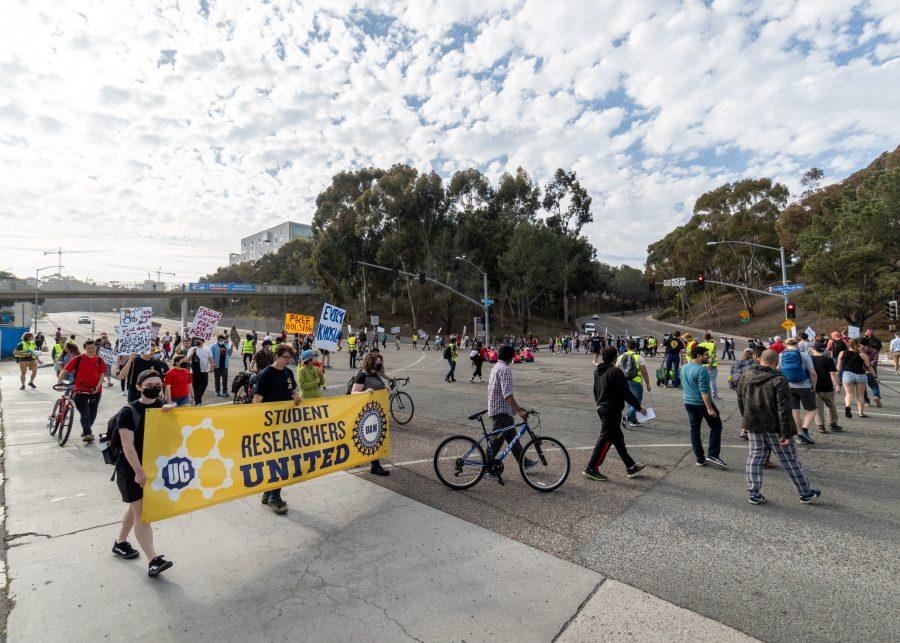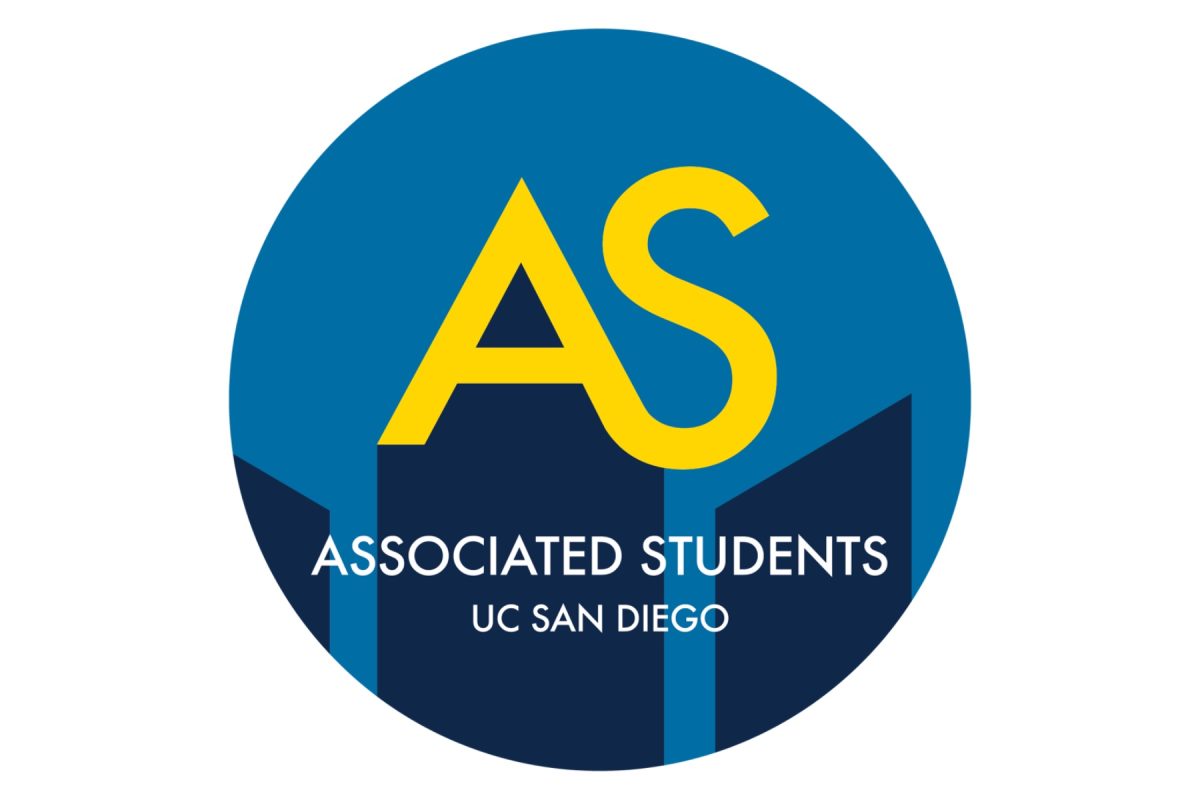UC San Diego academics associated with the union UAW (United Academic Workers) organized a demonstration on Tuesday April 26, marching from the Biomedical Sciences Laboratory to La Jolla Village Drive to protest against their claims of pervasive workplace abuse, workplace discrimination, inadequate pay, and extreme rent burden. During their demonstration, protestors gathered in the street and closed off access to Interstate 5, causing traffic congestion in a bid to bring attention to their cause.
The protest was in response to recent bargaining sessions the union had with UC administrators, in which UC allegedly drew back on important worker rights and benefits. According to UAW claims, UC administrators have been reluctant to implement important employer benefits to ensure equity such as family leave, fair housing, and respectable compensation.
The main issue concerning demonstrators was the lack of proper compensation by the University of California for academic workers, despite the ongoing inflation in San Diego.
“They are proposing pay raises that are actually pay cuts because they are below the rate of inflation,” Zach Goldberg, a third-year PhD biology student, said. “None of us can really afford rent here, it’s one of the most expensive cities in the country and we get paid like garbage. I spend more than half my income on rent.”
The inflation rate in San Diego hit 8.2 percent in the beginning of the year. This now makes San Diego’s inflation rate the third highest in the country. According to the Bureau of Labor Statistics, in March, San Diego experienced an astonishing 7.9 percent overall price increase in food, energy, and housing.
“There’s no way to sugar coat it, the university is exploiting us,” Adu Vengal, a second-year graduate student in the math department, said. “They know that we are rent burdened. They know how much costs have increased in San Diego. They proposed three percent wage increases. Those aren’t wage increases, those are wage cuts.”
Peter Kim, a graduate student in the physics department, echoed that the proposed pay raises feel like a “pay cut” given the inflation rate.
“One of the major poignant things that are happening right now is bargaining,” Kim said. “The UC is actively denying an open bargaining table for all the UCs to bargain together. The UC actually proposed their own contract to Student Researchers United union and part of the contract was that we were gonna get three to four percent raises which is, if you look at inflation rates nowadays, an effective pay cut.”
“Part of the nature of the exploitation that we are facing is that we are not making enough money to live where we work,” Lauren Bibi, a PhD student in the biology department, said. “We need better wages now. In combination with the lack of fair wages and lack of job security for workers, there’s also a big open problem of supervisor abuse on the campus. It’s sort of an open secret in academia but something that’s not open publicly.”
This problem of work environment mistreatment was another major concern amongst demonstrators and of which many felt triggered the full-fledged protest. Along with effective pay increases to counter inflation, protestors also wanted to emphasize the need to implement anti-bullying protections for workers.
Goldberg added that many labs had a toxic work environment, with international students allegedly being the most vulnerable.
“There’s harassment, discrimination, bullying, and hazing that happens in labs as a matter of course and not uncommon, it’s everywhere and it’s all the time,” Goldberg said. “We have international students who are intimidated. Their supervisors hold their visas over their heads to make them work harder.”
“A graduate student was bullied out of his lab in front of the rest of the department by a supervisor and was eventually fired and kicked out of the program and basically deported back to India,” Amy Kanne, a PhD student in the computer science department, said. “There’s just no consequences for supervisors that engage in this type of behavior and that’s what we want written down into a contract with the UC.”
Erika Cervantes, a spokesperson for the University of California, responded to these allegations via email to Inside Higher Ed.
“We highly value the role all these employees play in supporting our students and our faculty, and UC’s mission,” Cervantes said. “Our overarching goal with each of these negotiations is a multi-year agreement that recognizes these employees’ many important contributions to the UC community with fair pay, quality health and family-friendly benefits, and a supportive and respectful work environment.”
Cervantes went on to say that UC hopes to have “good-faith negotiations” with the UAW to come to a resolution to the conflict. He also praised the “tremendous resilience, flexibility, and unwavering commitment” of employees and the UC community over the past two years.
“We respectfully disagree with the union’s assertions about takeaways and UC being intransigent,” Cervantes added. “Our proposals for postdocs and GSRs [graduate student researchers] include annual pay increases and enhanced paid leaves. We are very early in our bargaining with our other academic student employees and have not yet addressed those issues. We are committed to fair pay, quality benefits and a supportive, respectful work environment for all of our employees.”
Currently the bargaining process between the union and the University of California is ongoing, with no promised contracts established.
If one is in dire need of emergency housing on campus at UCSD, they may reach out to Basic Needs. The process begins when one fills out a Basic Needs Assistance form, but they may also email [email protected] for temporary housing.
If one is facing mental health struggles at UCSD, they may reach out to Counseling and Psychological Services at (858) 534-3755 or by messaging their provider via MyStudentChart.
Photo courtesy of Joe Orellana.















Alison McKinley • Jun 7, 2022 at 12:34 am
I think it is very brave of them to demonstrate and ask for better conditions! Students may have trouble finding their first job due to their lack of professional experience. I have found this article online, which may be helpful for students looking for their first workplace: https://resumeperk.com/blog/do-i-need-a-resume-for-my-first-job-resume-with-no-experience.
Janet Hitt • May 26, 2022 at 3:50 am
I fully support them. I also know students who have some disabilities. It is very difficult for them to find a good job. But I managed to find https://skillroads.com/blog/websites-for-disabled-job-seekers where there are good offers for such people. I hope this will help them in their search.